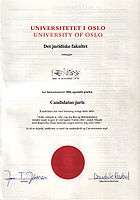Candidate of Law
Candidate of Law (Latin: candidatus/candidata juris) is the degree awarded to law students who have complete their studies in Denmark, Sweden and Finland for 4.5–6 years. The degree is roughly equal to the Master of Laws (LL.M.) degree in other parts of Europe.[1] Norway previously awarded the degree, but switched to the European system in 2008.

In Nordic countries, the exam can only be taken at a university with a diploma privilege granted by the government – though any institution may provide legal education. The competition for a study right in law at university is very fierce in all Nordic countries. There are usually more than 10 applicants to each place at Law faculties. The admission system however vary from every country.
Countries
Denmark
The Danish Candidatus/Candidata juris (Cand.jur.) is obtained after 5 years of law studies (180 + 120 ECTS). Undergraduate degree in Denmark is Bachelor i jura (BA Jur.) which take usually 3 years to complete (180 ECTS).[2] Four Danish universities are offering the degree in law.
Sweden
The Swedish Juristexamen is completed after 4.5 years of studying at the normal pace (270 ECTS). Previous Jurist kandidatexamen (Jur.kand.) was replaced in fall 2010 with the Juristexamen. Previously graduated lawyers are eligible to continue using their Jur.kand. title.
Finland
The FinnishOikeustieteen maisteri, abbreviated OTM (Swedish: Juris magister, JM) is obtained after 5 years of law studies (180 + 120 ECTS). Previous Oikeustieteen kandidaatti (OTK) was replaced in 2005 with the Oikeustieteen maisteri. Previously graduated lawyers were eligible to continue using their previous title.
Both before and after the Bologna process in 2005 the academic degree is split into two different grades. Previously, the lower degree was Varanotaari, abbreviated VN (Swedish: Vicenotarie), and currently the lower degree awarded is Oikeusnotaari, abbreviated ON (Swedish: Rättsnotarie, RN) after completing 3 years of study (180 ECTS).
The right to practice specific law-related occupations (e.g. judge, prosecutor, lawyer) require either OTM or OTK degree. The ON or VN degree alone doesn't give the right to practice law-related occupations in Finland.
Norway
The Norwegian Master i Rettsvitenskap is obtained after 5 years of law studies (300 ECTS).[3] Previous Candidatus/Candidata juris (Cand. jur.) which was 6-year program replaced in 2003 with the Master i Rettsvitenskap. Last Cand. jur. degree's were awarded in the spring 2007.
Traditionally, the student must swear following oath:
"I never consciously want to deviate from justice and justice, nor advise anyone to unnecessary conflict, or otherwise by counsel or action to promote any unlawful cause or activity."[4]
The oath is no longer spoken, but it is implied with a handshake during the graduation ceremony.
See also
References
- Stockholm university (13 Sep 2019). "Swedish Master of Laws (Juristexamen)". Retrieved 10 May 2020.
- Københavns universitet (2011-03-04). "Bachelor i jura". studier.ku.dk (in Danish). Retrieved 2020-05-10.
- Universitetet i Oslo. "Rettsvitenskap (jus) (master - 5 år)". www.uio.no (in Norwegian). Retrieved 2020-05-10.
- Universitetet i Oslo. "Eksamensoppgave 07 - JFEXFAC04". www.uio.no (in Norwegian). Retrieved 2020-05-10.
External links
- The Faculty of Law at the University of Copenhagen, Denmark
- The Faculty of Law at the University of Oslo, Norway
- The Faculty of Law at the University of Helsinki, Finland
- The Department of Law at Åbo Akademi, Finland
- The Faculty of Law at the University of Stockholm, Sweden
- The Faculty of Law at the University of Lund, Sweden
- The Faculty of Law at the University of Uppsala, Sweden
- The Faculty of Law at the University of Iceland
- Educational Credential Evaluators, Inc.